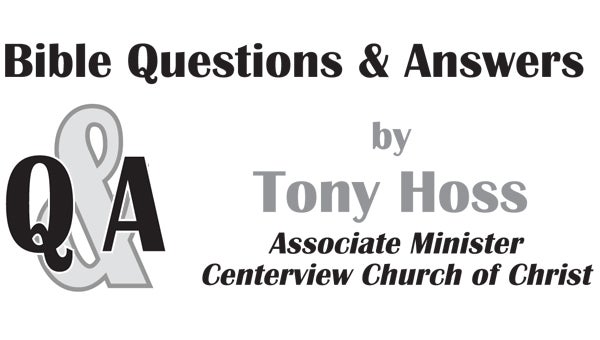Why should we forgive one another?
Published 9:06 am Thursday, May 4, 2023
|
Getting your Trinity Audio player ready...
|
“To forgive is to set a prisoner free and discover that the prisoner was you,” wrote Lewis Smedes.
I’ll never forget the video I saw of a session where a counselor urged a woman to forgive her mother. With great effort, the woman tried several times to utter words of forgiveness. Her entire face and body contorted with the failed efforts. Something very dark and oppressive controlled her soul.
Finally, she said out loud that she forgave her mother. Immediately, her countenance changed. The darkness that sucked the very life out of her vanished. She relaxed again. Peace swept over her like an ocean wave. Such is the power of forgiveness.
“Forgiveness makes us feel better,” says Bridgette, 6.
Yes, this is true as with the woman who forgave her mother. But what about the times when revenge is feeling a lot better than forgiveness?
Sometimes, the hurt is too great, the pain is too deep or the embarrassment is a life changer. All you can think about is immediate revenge – the sooner, the better. It’s the kind of revenge that keeps you up at night as you rehearse the details in your mind.
This is when you need a reason to forgive that is bigger than yourself and larger than the wrong you have suffered.
It is the right thing to do since Jesus forgives our sins by dying on the cross,” says Jonathan, 7.
The debt that we owe God for all our sins is far greater than any sin or sins against us. As Christians, we are forgiven people. In light of God’s forgiveness extended to us through the sacrificial death of Christ, we ought to be the most gracious people in that we’re quick to forgive.
To illustrate the power of greater forgiveness, Jesus told the parable of the two debtors. One owned a lot of money and the other a little. The creditor forgave the debts of both. “Tell me, therefore, which of them will love him more?” Jesus asked (Luke 7:42b).
It’s obvious. The greater the debt, the greater is the love for the one who forgave the debt.
We’re all debtors to God. By his sacrifice on the cross for our sins, Jesus paid our debt. If Christians fail to forgive those who wrong them, it’s only because they forget the size of the debt that Jesus paid on our behalf.
“Sometimes we say mean words. So sometimes we gotta say sorry,” says Dylan, 5.
Everyone has situations where mean words come easy. For me, they want to flow when I encounter mindless bureaucracy either in a human bureaucrat or an automated system. In the latter case, it seems like the options offered over the phone are never the ones that address my need. How about “press 1 for hurry up”?
Saying you’re sorry is never easy because it requires humility. Forgiveness is a lot easier when I compare the offense I’ve suffered with my cargo ship full of sins that God has buried in the deepest ocean. Suddenly, the wrong against me seems small.
Think about this: Forgiveness makes you a bigger, more gracious person. God wants you to live large. Read “Victory Over Darkness” by Neil Anderson.
Memorize this truth: “Forgive as the Lord forgave you,” (Colossians 3:13b, NIV).
Ask these questions: Would you like to break the bondage of bitterness and vindictiveness? The next time you’re tempted to counterattack, can you meditate on the forgiveness Jesus has extended to you? Can you forgive others by drawing upon the grace God has shown you?
(Kids Talk About God is designed for families to study the Bible together. Research shows that parents who study the Bible with their children give their character, faith and spiritual life a powerful boost.)



